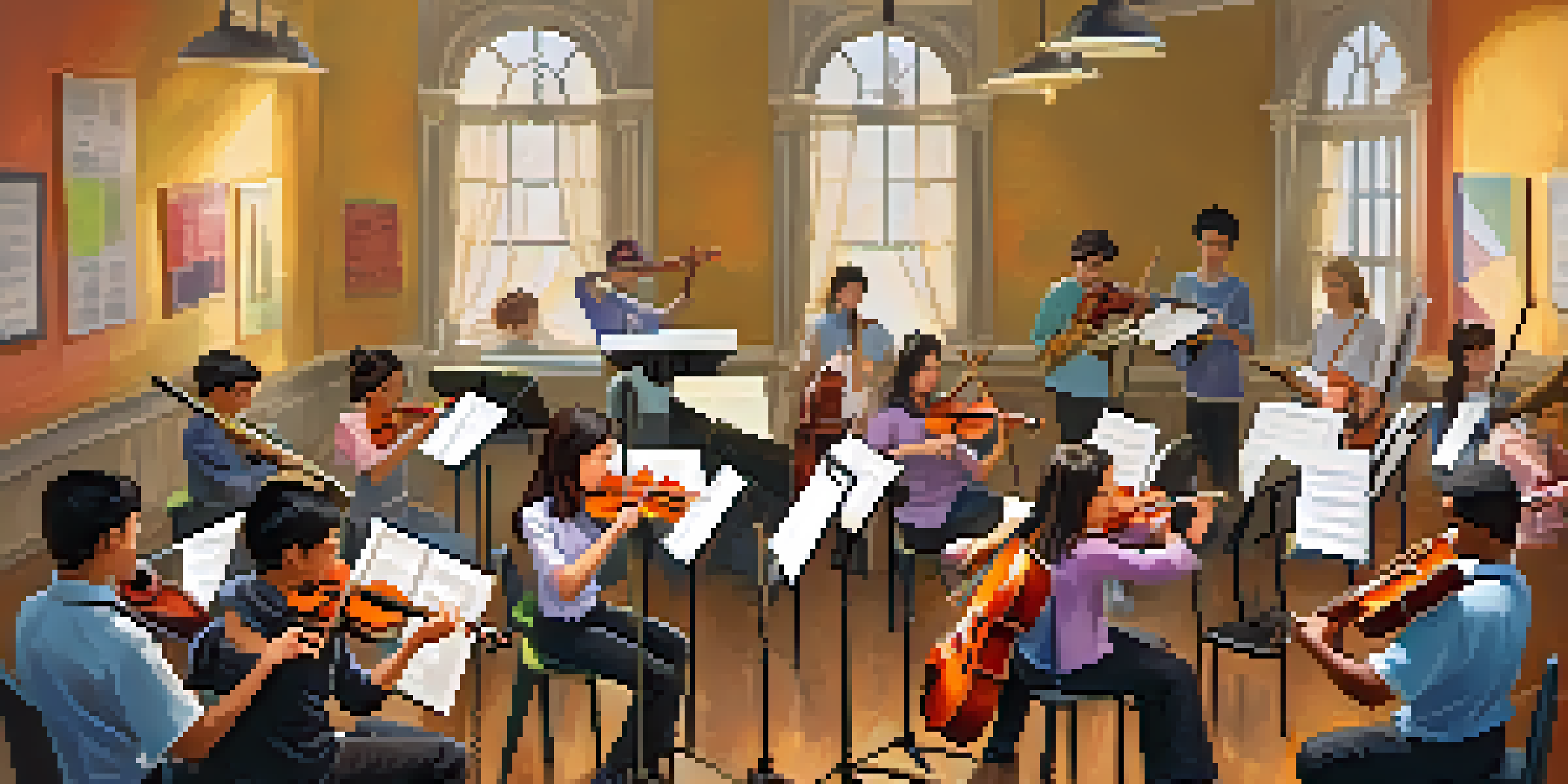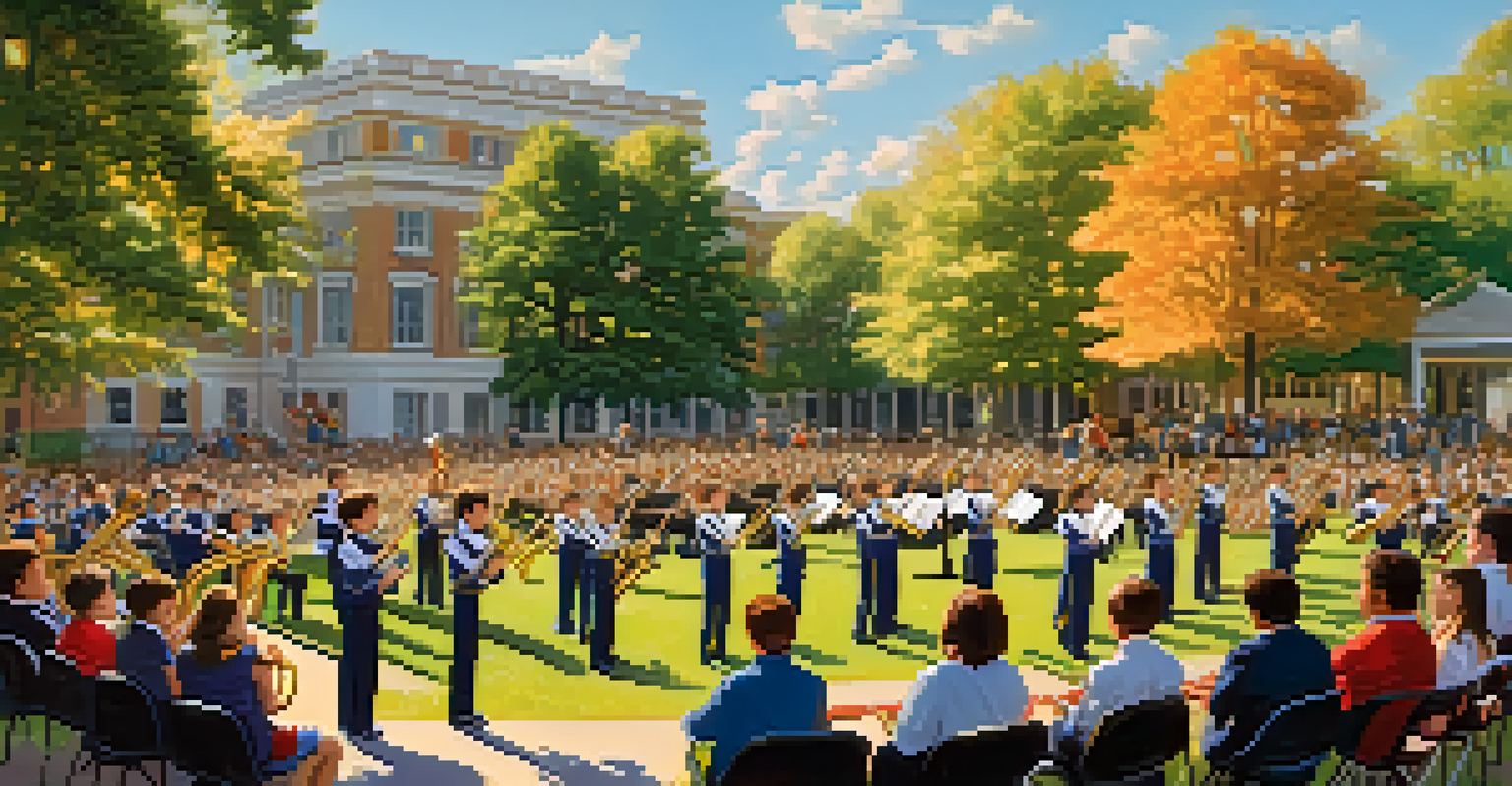The Effects of Music Education on Building Team Collaboration Skills

Music Education: A Foundation for Teamwork
Music education serves as a unique platform for students to learn teamwork. When individuals engage in music, whether in a band or choir, they quickly realize the importance of synchronizing their efforts to create harmony. This collaborative experience is essential, as students must listen to one another and adjust their playing to achieve a cohesive sound.
Music can change the world because it can change people.
By participating in music groups, students develop a sense of responsibility to their peers. Each member's contribution is vital, teaching them that their actions directly affect the whole ensemble. This realization fosters accountability, as students become aware that teamwork is not just about individual performance but also about supporting others.
Furthermore, music education encourages communication skills, a key element in effective teamwork. Musicians learn to express their ideas and feedback in a constructive manner, which translates well into any collaborative environment. The practice of sharing insights and suggestions nurtures an atmosphere of open dialogue, essential for successful teamwork.
Developing Empathy Through Collaborative Music Making
Engaging in music education cultivates empathy among students. By collaborating on musical pieces, students learn to appreciate diverse perspectives and styles, which are vital in any team setting. This shared experience fosters a deeper understanding of each other's roles and contributions.

When students perform together, they must be attuned to the emotions and expressions of their peers. This heightened sensitivity translates into a greater appreciation of teamwork, as they learn to value the unique strengths each individual brings to the group. Such empathy is crucial for resolving conflicts and building strong relationships.
Teamwork Skills Through Music Education
Music education fosters essential teamwork skills by teaching students the importance of collaboration, communication, and responsibility.
Moreover, the challenges faced during group performances help students navigate interpersonal dynamics. Whether it's adjusting to a sudden change in tempo or tackling a complex arrangement, these experiences teach students to adapt and support one another. Ultimately, this ability to empathize strengthens team bonds and enhances collaboration.
The Role of Discipline in Music Education and Teamwork
Discipline is a cornerstone of both music education and effective teamwork. Musicians must practice regularly to develop their skills and contribute meaningfully to their group. This commitment to improvement instills a strong work ethic that is equally important in collaborative endeavors.
The beautiful thing about learning is that no one can take it away from you.
As students learn to manage their time and prioritize practice, they also become more reliable teammates. They understand that consistent effort is necessary for the success of the entire group, reinforcing the idea that teamwork requires commitment from everyone involved. This shared discipline creates a culture of mutual respect.
Additionally, the structured environment of music education teaches students to follow direction and work within a framework. This ability to function within guidelines is essential for successful teamwork, as it prepares students to navigate roles and responsibilities in various group settings. Such discipline ultimately enhances collaboration and team effectiveness.
Creativity and Innovation in Group Music Projects
Music education fosters creativity, which is a vital component of effective teamwork. When students collaborate on musical projects, they are encouraged to experiment and think outside the box. This creative freedom not only enhances their musical abilities but also promotes innovative problem-solving skills.
As students brainstorm and compose together, they learn to combine their ideas and perspectives. This collaborative creativity leads to unique outcomes that reflect the collective effort of the group. Such experiences teach students that diverse input can lead to innovative solutions, a lesson that is invaluable in any team setting.
Empathy and Conflict Resolution
Collaborative music-making cultivates empathy and conflict resolution skills, helping students appreciate diverse perspectives and navigate disagreements.
Moreover, the process of creating music as a group allows students to embrace risk-taking. They become more comfortable with trying new things and understanding that mistakes are part of the creative process. This willingness to innovate fosters a dynamic team environment where collaboration thrives.
Building Communication Skills Through Music Education
Effective communication is at the heart of successful teamwork, and music education plays a crucial role in developing these skills. In a musical ensemble, students must convey their ideas and intentions clearly to achieve a harmonious performance. This necessity for communication encourages students to articulate their thoughts in a constructive manner.
Additionally, musicians learn to interpret non-verbal cues, such as body language and facial expressions, which are vital for understanding team dynamics. Being attuned to these signals helps students respond appropriately and fosters a supportive environment. This heightened awareness enhances collaboration and strengthens team relationships.
Furthermore, music education often involves group discussions about performances and compositions. These discussions allow students to practice giving and receiving feedback, an essential aspect of teamwork. By learning to communicate effectively, students become more adept at navigating group dynamics and achieving collective goals.
Conflict Resolution Skills Gained from Music Collaboration
Conflict is an inevitable part of any team experience, and music education provides a unique opportunity to develop conflict resolution skills. Within a musical group, differing opinions about interpretation or arrangement can arise. Learning to navigate these disagreements fosters critical thinking and compromise among students.
In the context of music, students learn to approach conflicts with a solution-oriented mindset. They are encouraged to discuss their differences openly, weighing the pros and cons of various ideas. This collaborative problem-solving process instills a sense of teamwork that extends beyond music into other areas of their lives.
Long-Term Benefits of Music Skills
The teamwork skills developed in music education have lasting effects, enhancing students' abilities to work effectively in various professional and social settings.
Moreover, resolving conflicts in a musical setting reinforces the idea that differing viewpoints can lead to stronger outcomes. By embracing diverse perspectives, students learn that collaboration is enriched by healthy debate and discussion. This understanding equips them with the tools to handle conflicts in any team scenario.
Long-Term Benefits of Team Skills Developed in Music Education
The team collaboration skills developed through music education have long-lasting benefits. Students who engage in music programs often carry these skills into their future careers, enhancing their ability to work effectively in diverse teams. The experience gained from collaborating in music is invaluable in the professional world.
Moreover, these skills contribute to personal development as well. The ability to work well with others and communicate effectively is essential for building strong relationships in all aspects of life. Music education lays the groundwork for students to become empathetic, disciplined, and innovative individuals.

As these students progress through life, they will find that the teamwork skills honed in music education serve them well in various contexts. Whether in a workplace, community project, or social setting, the lessons learned from music collaboration will continue to benefit them, illustrating the enduring impact of music education on team collaboration skills.